Many people over 65 take five or more medications every day. Some of them have been on the same pills for years-maybe since a hospital stay, a specialist visit, or even a routine checkup. But here’s the truth: not all of those pills are still helping you. Some might even be hurting you. And they’re costing you hundreds, sometimes thousands, of dollars a year.
Why You Might Be Taking Pills You Don’t Need
Polypharmacy-the use of five or more medications-is common in older adults. About 41% of people over 65 are on this many drugs, according to a 2019 JAMA Internal Medicine study. But the problem isn’t just the number. It’s what’s in the list. A pill prescribed for high blood pressure might now be causing dizziness. A sleep aid you started ten years ago might be making your memory worse. A vitamin or supplement your doctor once recommended might no longer be needed after blood tests showed normal levels. The cost adds up fast. One unnecessary $50-a-month medication means $600 a year gone. Stop three of them, and you’re saving over $1,800. That’s not pocket change. That’s groceries, gas, or a new pair of shoes. And it gets worse: medication-related hospitalizations cost an average of $15,700 each, according to 2022 Medicare data. Many of these are preventable.What Deprescribing Really Means
Deprescribing isn’t about quitting pills cold turkey. It’s not about ignoring your doctor. It’s a careful, step-by-step process of reviewing your meds and stopping the ones that don’t do enough good-or do too much harm. It started in Canada in the early 2010s, led by researchers like Dr. Barbara Farrell and Dr. Cara Tannenbaum. Now, it’s a growing movement in the U.S., backed by the American Academy of Family Physicians, the American Geriatrics Society, and even Kaiser Permanente. In one program, they cut inappropriate medications by 35% and saved $1.2 million in a single year. That’s not magic. That’s smart medicine. The goal? Reduce side effects, lower fall risks, improve memory, and save money-all at the same time. A 2021 JAMA Network Open study found that stopping proton pump inhibitors (common stomach acid pills) saved patients $420 a year and lowered the chance of pneumonia by 25%. That’s a win-win.How to Start the Conversation
You don’t need to wait for your doctor to bring it up. Take control. Before your next appointment, do this:- Gather every pill, capsule, patch, and supplement you take-including over-the-counter drugs and herbal remedies.
- Write down why you take each one, how often, and how much you pay per month.
- Bring the whole pile to your appointment. Doctors call this the “brown bag review.”
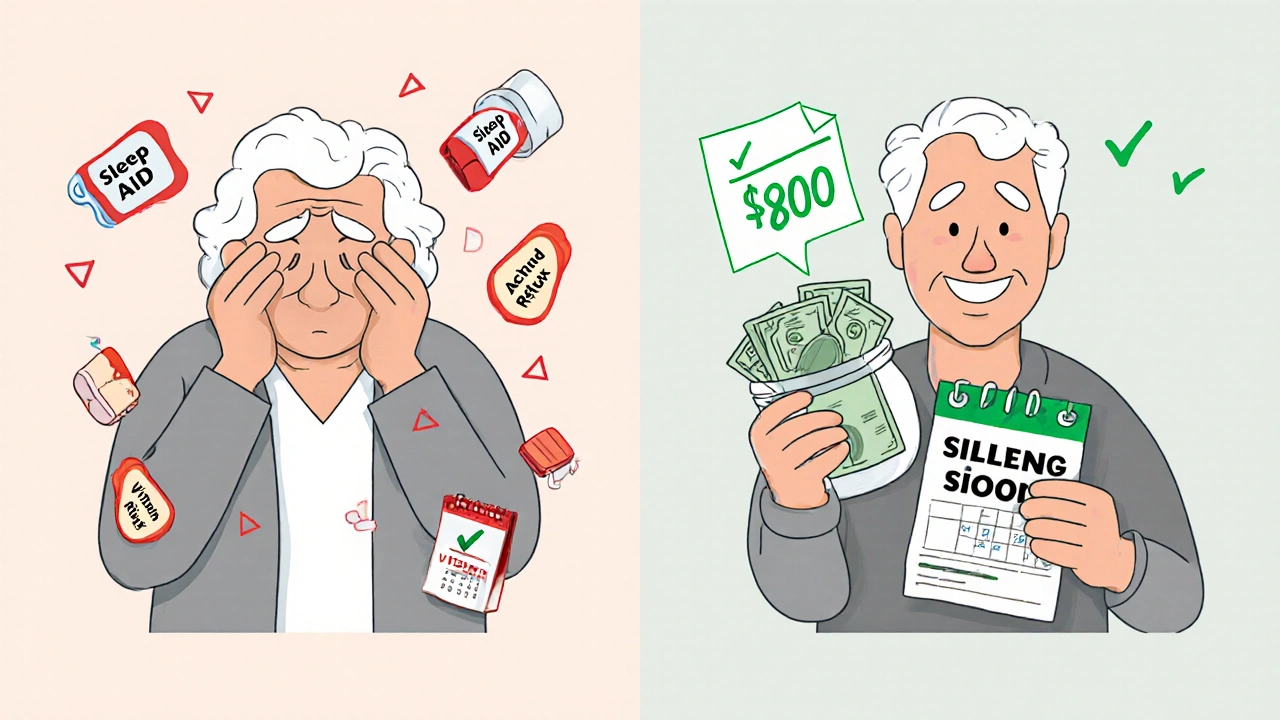
Ask These Five Questions
Don’t just nod along when your doctor says, “Keep taking this.” Ask:- Why am I taking this? What condition is it meant to treat? Has that condition changed?
- What are the benefits? Is it still working? Have I felt better since I started it?
- What are the risks? Could it cause dizziness, confusion, falls, or memory problems?
- Can I stop or reduce it? Is there a safer, cheaper, or no-pill alternative?
- Who do I call if something changes? What signs should I watch for if we stop it?
What Happens When You Stop a Pill
You won’t stop everything at once. That’s dangerous. Deprescribing is slow. One medication at a time. Maybe over 4 to 12 weeks. For example: if you’re on a blood pressure pill that’s causing dizziness, your doctor might lower the dose first. Then, after a few weeks, try stopping it entirely-with regular check-ins. A 2019 BMJ study showed that stopping antihypertensives too fast led to a 12% rebound in blood pressure. That’s why timing matters. Some pills can be stopped safely right away. Others need a taper. Your pharmacist can help with this. In fact, 85% of community pharmacies in the U.S. offer free medication reviews under Medicare Part D. They’ll check for duplicates, outdated prescriptions, and cheaper alternatives. One 2022 study found they identified $1,200 in annual savings per patient on average.Real People, Real Savings
A 72-year-old woman from Ohio stopped three medications after a brown bag review: a $120/month sleep aid she didn’t need, a $45/month supplement her cardiologist said was redundant, and a $110/month acid reflux pill she’d been on since 2015. Her annual savings? $840. She also stopped feeling foggy in the mornings. On Reddit, a user named SeniorSaver87 cut out a $90/month vitamin D supplement (after a blood test showed normal levels) and a $75/month herbal remedy. That’s $1,980 saved in a year. But not everyone succeeds. The National Council on Aging found that 18% of people who tried stopping meds on their own ended up in the ER with side effects-costing an average of $1,200 in emergency care. That’s why you never do this alone.Who Can Help You
You don’t have to figure this out by yourself.- Your primary care doctor is your main partner. They know your full history.
- Your pharmacist can spot duplicate prescriptions, expired meds, and cheaper generics. Ask for a free Medication Therapy Management (MTM) session.
- Specialists (like your cardiologist or neurologist) may have prescribed a pill that’s no longer needed. Ask your primary doctor to coordinate with them.
What’s Changing Right Now
The system is starting to catch up. Since 2011, Medicare Part D has required plans to offer free medication reviews to high-risk patients. The 2023 Inflation Reduction Act capped insulin at $35/month and expanded coverage for comprehensive medication reviews. In 2024, Medicare Advantage plans started using medication safety as part of their quality ratings-meaning doctors and hospitals get paid more for helping patients deprescribe. AI tools like MedStopper are now used in 127 hospitals to flag unnecessary prescriptions. One 2023 JAMA study showed they spot cost-saving opportunities with 89% accuracy.Don’t Wait for a Crisis
Medication overload is now the #1 recommended intervention for reducing harm in older adults, according to the Lown Institute. It’s not just about saving money-it’s about staying independent, avoiding falls, and keeping your mind sharp. You don’t need to be sick to start. You don’t need to wait for a hospital visit. Just bring your pills to your next appointment. Ask the five questions. Let your doctor know you’re thinking about cutting costs and improving safety. The right pills help. The wrong ones hurt. And you deserve to be on only what truly matters.What is deprescribing?
Deprescribing is the planned, gradual process of stopping medications that are no longer needed, are causing harm, or cost more than they benefit. It’s done with your doctor’s guidance to improve safety and reduce expenses.
Can I stop my meds on my own?
No. Stopping certain medications suddenly-like blood pressure pills, antidepressants, or steroids-can cause serious side effects, including rebound high blood pressure, seizures, or worsening depression. Always work with your doctor or pharmacist.
How much money can I save by deprescribing?
On average, stopping one unnecessary $50/month medication saves $600 a year. Stopping three could save over $1,800. Avoiding a single medication-related hospitalization can save $15,700. Many patients report saving $1,000-$2,000 annually just by reviewing their pills.
What if my doctor says no?
Ask why. Request a written reason. You can also ask for a referral to a pharmacist who offers free Medication Therapy Management under Medicare Part D. Sometimes, a second opinion from a geriatrician or a specialist in medication safety helps.
Are supplements always safe to stop?
Not always-but many are. A 2022 study found that 60% of older adults take supplements with no proven benefit. If your blood tests show normal vitamin levels, you likely don’t need daily pills. Ask your doctor for a blood test before continuing.
Does deprescribing work for people under 65?
Yes. About 15% of adults aged 40-64 take five or more medications. If you’re on long-term painkillers, acid reflux meds, or sleep aids with no clear benefit, deprescribing can still help. The same principles apply: review, question, taper, monitor.
What if I feel worse after stopping a pill?
Contact your doctor immediately. Some symptoms-like increased anxiety, dizziness, or sleep problems-can be withdrawal effects. Most are temporary and can be managed with a slower taper. Never ignore new or worsening symptoms.
How often should I review my medications?
At least once a year. More often if you’ve had a new diagnosis, changed doctors, or started a new medication. If you’re on high-risk drugs like benzodiazepines, anticholinergics, or blood thinners, every 3-6 months is ideal.
Can my pharmacist help me save money?
Yes. Most community pharmacies offer free Medication Therapy Management (MTM) under Medicare Part D. They can find cheaper generics, spot duplicates, and suggest over-the-counter alternatives. One study found they saved patients an average of $1,200 a year.
Is deprescribing covered by insurance?
Yes. Medicare Part D requires plans to offer free medication reviews to high-risk patients. Many Medicare Advantage plans now cover comprehensive deprescribing consultations. Ask your plan or pharmacist about available services.
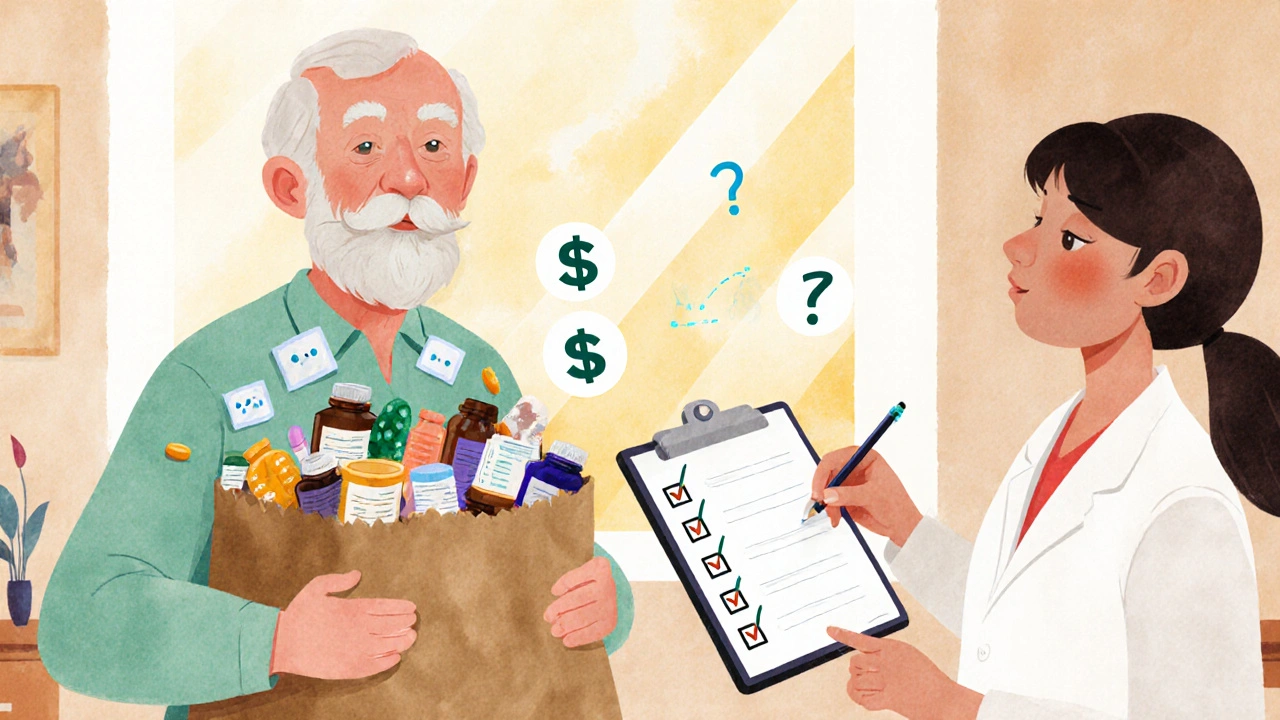
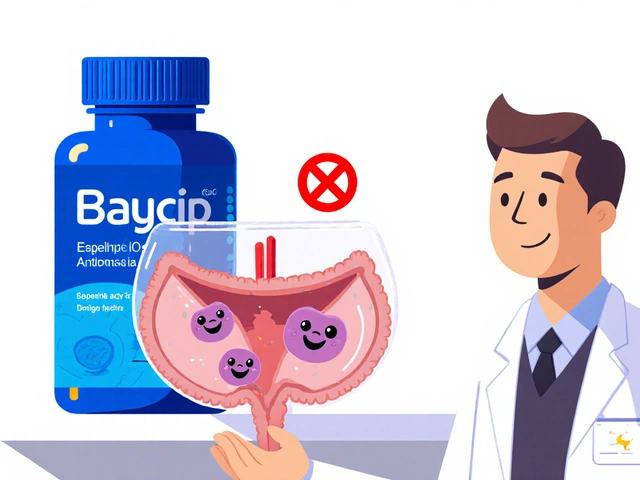
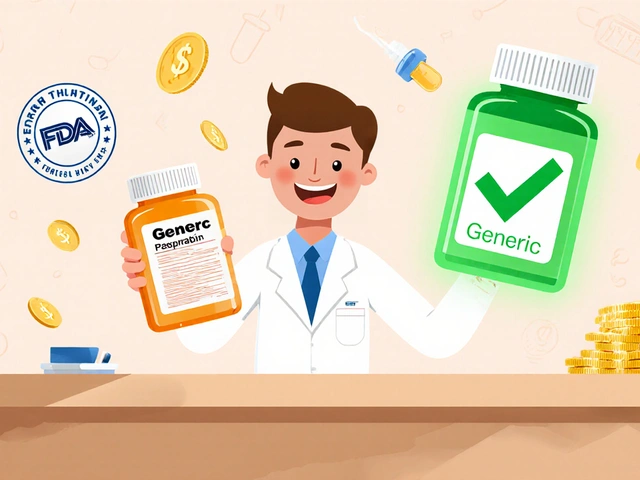
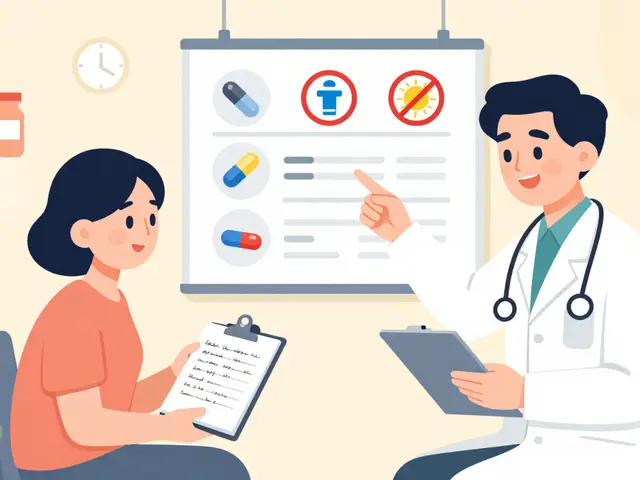

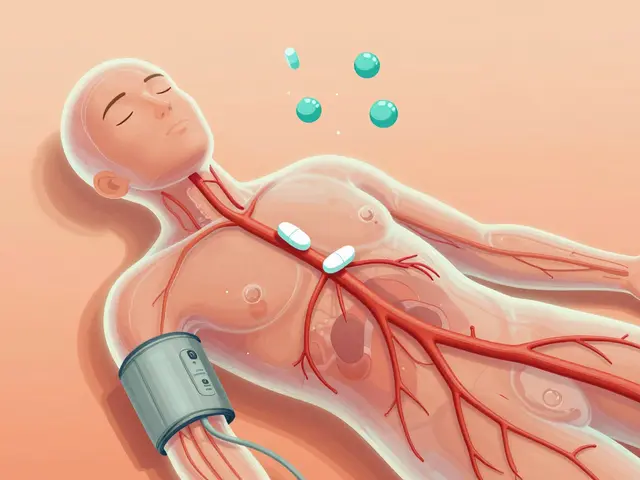
Matthew Peters
20 November, 2025 . 13:10 PM
Just had my brown bag review last week. Walked out with three meds cut, $900 saved, and my brain doesn’t feel like it’s wrapped in cotton anymore. Why do we wait until we’re falling over to ask these questions? This isn’t rocket science, it’s basic self-advocacy.
Kristi Bennardo
21 November, 2025 . 19:15 PM
While I appreciate the sentiment, this article is dangerously oversimplified. Deprescribing without rigorous monitoring is medical negligence. Many of these patients are on polypharmacy due to complex comorbidities. To suggest that cutting pills = savings is not only reductive-it’s potentially lethal. I’ve seen patients crash after being told to ‘just stop’ their antihypertensives. This isn’t a budgeting tip; it’s a clinical process.
Shiv Karan Singh
21 November, 2025 . 19:23 PM
lol so now we're telling old people to stop taking pills? 😂 next they'll say 'just stop eating sugar' and 'why are you still breathing?'. also, who pays for the 30-min pharmacist consults? not me. 🤷♂️
Michael Fessler
23 November, 2025 . 04:01 AM
As a clinical pharmacist, I’ve done over 800 MTM sessions. The most common finds? Duplicate anticholinergics, outdated statins after liver enzyme normalization, and OTC NSAIDs masking silent GI bleeds. The $1,200 average savings? That’s conservative. One guy was taking three different PPIs. Three. He didn’t even know they were all the same drug class. This isn’t hype-it’s harm reduction with a spreadsheet.
Matthew Karrs
24 November, 2025 . 01:46 AM
Let’s be real-this is just Big Pharma’s way of making you feel guilty for taking your meds. Who really benefits here? Insurance companies. Medicare. The same people who raised your premiums last year. Now they want you to ‘deprescribe’ so they can cut costs on your back. I’ve seen people get hospitalized after being pressured to stop antidepressants. This isn’t empowerment-it’s cost-shifting disguised as wellness.
Liam Strachan
24 November, 2025 . 13:56 PM
My mum did the brown bag thing last month. She was so nervous-thought the doctor would think she was being difficult. But the pharmacist found two duplicates and a supplement that was making her constipated. She’s now saving $600 a year and sleeps better. Sometimes the simplest things are the hardest to ask for. Thanks for normalizing this.
Ravi boy
26 November, 2025 . 07:26 AM
bro i took my grandpa to his appt last week he brought like 12 bottles and the doc just said oh u know what just stop the melatonin and the ginkgo and he did and now he aint dizzy all day and saved like 100 a month i mean its wild how easy it was like why dont they just do this more often
daniel lopez
28 November, 2025 . 06:19 AM
They don’t want you to know this because it breaks the pill mill. Every time you stop a drug, a billion-dollar industry loses revenue. You think your doctor cares? They get paid per visit, per script. Deprescribing? No CPT code. No bonus. No kickback. This isn’t about health-it’s about profit. And the government’s pushing it because they can’t afford to keep paying for your side effects. You’re being used as a cost-cutting experiment.
Gerald Cheruiyot
28 November, 2025 . 09:58 AM
There’s a quiet dignity in shedding what no longer serves you. Not just pills-but habits, fears, the weight of years spent doing what you were told. We’re taught to trust authority. But sometimes, the most radical act is to pause. To ask. To wonder if the thing you’ve carried for a decade still fits. Maybe it’s not about stopping meds. Maybe it’s about finally listening to your own body after decades of being talked over.
Nosipho Mbambo
29 November, 2025 . 17:58 PM
I’ve seen this go wrong… so many times. My aunt stopped her beta-blocker because a Reddit post said it was ‘useless’-she had a stroke two weeks later. The system is broken, yes-but the answer isn’t ‘just stop everything.’ It’s better access to geriatricians, not DIY med audits. This article is dangerously naive. And don’t even get me started on the ‘free pharmacist reviews’-they’re only available in 3 out of 12 pharmacies in my town. This isn’t empowerment. It’s a privilege.